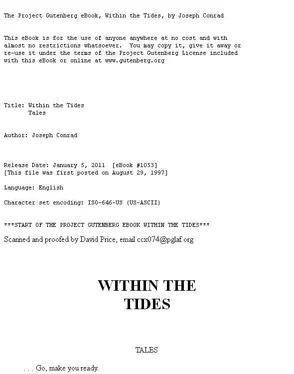“But the first time George attempts to speak to Captain Harry his heart slides down into his boots. Captain Harry only laughs at the notion of staying ashore. He wants no holiday, not he. But Jane thinks of remaining in England this trip. Go about a bit and see some of her people. Jane was the Captain’s wife; round-faced, pleasant lady. George gives up that time; but Cloete won’t let him rest. So he tries again; and the Captain frowns. He frowns because he’s puzzled. He can’t make it out. He has no notion of living away from his Sagamore . . .
“Ah!” I cried. “Now I understand.”
“No, you don’t,” he growled, his black, contemptuous stare turning on me crushingly.
“I beg your pardon,” I murmured.
“H’m! Very well, then. Captain Harry looks very stern, and George crumples all up inside. . . He sees through me, he thinks. . . Of course it could not be; but George, by that time, was scared at his own shadow. He is shirking it with Cloete, too. Gives his partner to understand that his brother has half a mind to try a spell on shore, and so on. Cloete waits, gnawing his fingers; so anxious. Cloete really had found a man for the job. Believe it or not, he had found him inside the very boarding-house he lodged in—somewhere about Tottenham Court Road. He had noticed down-stairs a fellow—a boarder and not a boarder—hanging about the dark—part of the passage mostly; sort of ‘man of the house,’ a slinking chap. Black eyes. White face. The woman of the house—a widow lady, she called herself—very full of Mr. Stafford; Mr. Stafford this and Mr. Stafford that. . . Anyhow, Cloete one evening takes him out to have a drink. Cloete mostly passed away his evenings in saloon bars. No drunkard, though, Cloete; for company; liked to talk to all sorts there; just habit; American fashion.
“So Cloete takes that chap out more than once. Not very good company, though. Little to say for himself. Sits quiet and drinks what’s given to him, eyes always half closed, speaks sort of demure. . . I’ve had misfortunes, he says. The truth was they had kicked him out of a big steam-ship company for disgraceful conduct; nothing to affect his certificate, you understand; and he had gone down quite easily. Liked it, I expect. Anything’s better than work. Lived on the widow lady who kept that boarding-house.”
“That’s almost incredible,” I ventured to interrupt. “A man with a master’s certificate, do you mean?”
“I do; I’ve known them ’bus cads,” he growled, contemptuously. “Yes. Swing on the tail-board by the strap and yell, ‘tuppence all the way.’ Through drink. But this Stafford was of another kind. Hell’s full of such Staffords; Cloete would make fun of him, and then there would be a nasty gleam in the fellow’s half-shut eye. But Cloete was generally kind to him. Cloete was a fellow that would be kind to a mangy dog. Anyhow, he used to stand drinks to that object, and now and then gave him half a crown—because the widow lady kept Mr. Stafford short of pocket-money. They had rows almost every day down in the basement. . .
“It was the fellow being a sailor that put into Cloete’s mind the first notion of doing away with the Sagamore . He studies him a bit, thinks there’s enough devil in him yet to be tempted, and one evening he says to him . . . I suppose you wouldn’t mind going to sea again, for a spell? . . . The other never raises his eyes; says it’s scarcely worth one’s while for the miserable salary one gets. . . Well, but what do you say to captain’s wages for a time, and a couple of hundred extra if you are compelled to come home without the ship. Accidents will happen, says Cloete. . . Oh! sure to, says that Stafford; and goes on taking sips of his drink as if he had no interest in the matter.
“Cloete presses him a bit; but the other observes, impudent and languid like: You see, there’s no future in a thing like that—is there? . . Oh! no, says Cloete. Certainly not. I don’t mean this to have any future—as far as you are concerned. It’s a ‘once for all’ transaction. Well, what do you estimate your future at? he asks. . . The fellow more listless than ever—nearly asleep.—I believe the skunk was really too lazy to care. Small cheating at cards, wheedling or bullying his living out of some woman or other, was more his style. Cloete swears at him in whispers something awful. All this in the saloon bar of the Horse Shoe, Tottenham Court Road. Finally they agree, over the second sixpennyworth of Scotch hot, on five hundred pounds as the price of tomahawking the Sagamore . And Cloete waits to see what George can do.
“A week or two goes by. The other fellow loafs about the house as if there had been nothing, and Cloete begins to doubt whether he really means ever to tackle that job. But one day he stops Cloete at the door, with his downcast eyes: What about that employment you wished to give me? he asks. . . You see, he had played some more than usual dirty trick on the woman and expected awful ructions presently; and to be fired out for sure. Cloete very pleased. George had been prevaricating to him such a lot that he really thought the thing was as well as settled. And he says: Yes. It’s time I introduced you to my friend. Just get your hat and we will go now. . .
“The two come into the office, and George at his desk sits up in a sudden panic—staring. Sees a tallish fellow, sort of nasty-handsome face, heavy eyes, half shut; short drab overcoat, shabby bowler hat, very careful—like in his movements. And he thinks to himself, Is that how such a man looks! No, the thing’s impossible. . . Cloete does the introduction, and the fellow turns round to look behind him at the chair before he sits down. . . A thoroughly competent man, Cloete goes on . . . The man says nothing, sits perfectly quiet. And George can’t speak, throat too dry. Then he makes an effort: H’m! H’m! Oh yes—unfortunately—sorry to disappoint—my brother—made other arrangements—going himself.
“The fellow gets up, never raising his eyes off the ground, like a modest girl, and goes out softly, right out of the office without a sound. Cloete sticks his chin in his hand and bites all his fingers at once. George’s heart slows down and he speaks to Cloete. . . This can’t be done. How can it be? Directly the ship is lost Harry would see through it. You know he is a man to go to the underwriters himself with his suspicions. And he would break his heart over me. How can I play that on him? There’s only two of us in the world belonging to each other. . .
“Cloete lets out a horrid cuss-word, jumps up, bolts away into his room, and George hears him there banging things around. After a while he goes to the door and says in a trembling voice: You ask me for an impossibility. . . Cloete inside ready to fly out like a tiger and rend him; but he opens the door a little way and says softly: Talking of hearts, yours is no bigger than a mouse’s, let me tell you. . . But George doesn’t care—load off the heart, anyhow. And just then Captain Harry comes in. . . Hallo, George boy. I am little late. What about a chop at the Cheshire, now? . . . Right you are, old man. . . And off they go to lunch together. Cloete has nothing to eat that day.
“George feels a new man for a time; but all of a sudden that fellow Stafford begins to hang about the street, in sight of the house door. The first time George sees him he thinks he made a mistake. But no; next time he has to go out, there is the very fellow skulking on the other side of the road. It makes George nervous; but he must go out on business, and when the fellow cuts across the road-way he dodges him. He dodges him once, twice, three times; but at last he gets nabbed in his very doorway. . . What do you want? he says, trying to look fierce.
Читать дальше












